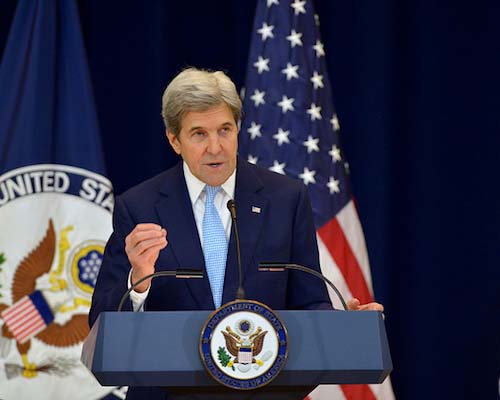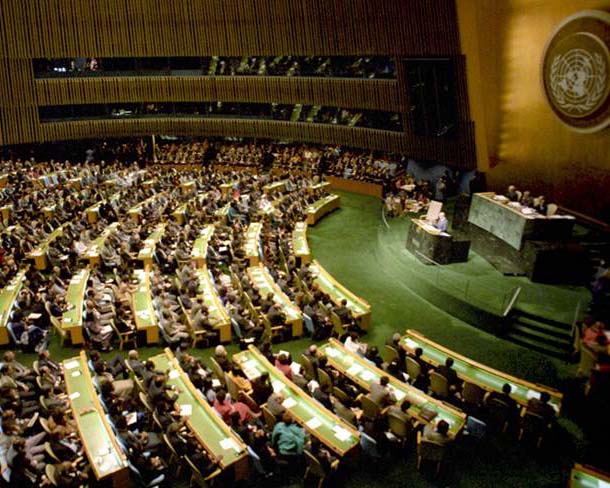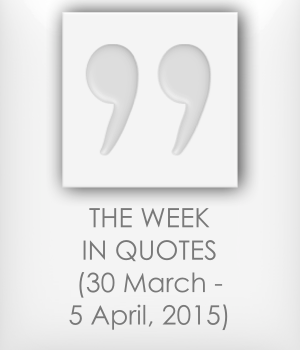Kerry's parameters force Israel to take a hard look in the mirror

John Kerry’s speech this week clearly and rationally explained why the status quo will not enable Israel to maintain its Jewish and democratic character. Are Israelis paying attention?
By Elie Podeh and Nimrod Goren
Throughout 2016, analysts were wondering what – if at all – will be President Obama’s final move regarding the Israeli-Palestinian conflict. The options discussed included a presidential speech (like the Cairo speech in 2009), updating the Clinton parameters of 2000, and the advancement of a resolution at the UN Security Council. Eventually, all answers were somewhat right: UN Security Council Resolution 2334 was not initiated by the U.S., but it was definitely encouraged by the American administration. Obama himself did not deliver a speech, but his Secretary of State, John Kerry, did, conveying the frustration and disappointment of the administration from both sides, and especially from Israel’s settlement policy.
The Kerry speech introduced parameters for the resolution of the Israeli-Palestinian conflict. They did not differ much from the Clinton Parameters, and were more ambiguous and concise. Still, it was a much-needed move in light of the regional changes that took place since 2000, and of issues which gained traction since (such as Israel’s request that Palestinians recognize it as a ‘Jewish state’). The updated parameters provide Israelis – public and politicians alike – more clarity regarding the two-state solution and the steps needed in order to get there. They also generate new momentum by enabling the discussion on an end-game agreement to be based on a recent document, which is part of a set of international moves to advance conflict resolution, and not on a plan devised sixteen years ago.
The Trump effect
A key difference between the Kerry parameters and those of Clinton is the reference made by Kerry to the Arab Peace Initiative (which was not yet published in 2000) and to regional ramifications of Israeli-Palestinian peace. Kerry highlighted the unique opportunity that Israel is currently facing – an opportunity to establish normal ties with Arab countries, and to even launch a joint security framework. Kerry stressed that the fulfillment of this opportunity is clearly linked to progress towards Israeli-Palestinian peace, contrasting recent claims by Netanyahu that normalization between Israel and Arab countries can precede Israeli-Palestinian peace. In his speech, Kerry tried to convince Israelis that peace will bring them concrete regional benefits. He focused on relations with the Arab world and on chances for enhanced security, but he could also have mentioned the EU’s offer for a Special Privileged Partnership with Israel and the future Palestinian state, as another incentive for peace.
Kerry refrained from addressing a major change that took place since the Clinton parameters were issued – the split between the West Bank and the Gaza Strip following the Hamas takeover of Gaza. The Palestinian divide is a major obstacle on the road for a two-state solution, and is one that the international community tends to avoid due to the sensitivity of dealing with Hamas. It is worth remembering that because of this obstacle, the negotiations between Olmert and Abbas in 2007-8 were aimed to reach a “shelf-agreement” only; one that will be implementable only after the restoration of Palestinian unity. While the Quartet report of July 2016 focused on this thorny issue, Kerry decided to skip it altogether.

Republican presidential candidate Donald Trump addresses the 2016 AIPAC Police Conference in Washington D.C., March 21, 2016. (Photo courtesy of AIPAC)
Paradoxically, it was Trump’s victory and his positions on the Israeli-Palestinian issue that may have increased Obama’s motivation to make a final move. The UN Security Council resolution and the Kerry speech leave a legacy for Trump to deal with, but they also provide clear guidelines for future American administrations and for other countries that want to contribute to Israeli-Palestinian peacemaking. These steps demonstrated the continuity in American policy since 1967 regarding the occupied territories and Jerusalem.
Despite efforts along the years to mask and downplay differences between Israel and the U.S. on these issues, the American position – of Republican and Democratic administrations alike – has remained remarkably the same. A different policy by the Trump administration, if such will actually be taken, will be the exception. One can only wonder why hasn’t the Obama administration introduced its clear-cut positions earlier, during a time that still allowed the international community to act on them.
Looking in the mirror
The Kerry speech put a mirror in front of the Israeli government and society. Kerry clearly and rationally explained why the continuation of the status quo will not enable Israel to maintain its Jewish and democratic character in the long run. The ongoing occupation and the expansion of settlements makes the two-state solution gradually less feasible, and may lead to an irreversible situation. Those in the Israeli Right, who are ideologically committed to the settlements, do not have a reasonable answer to this dilemma, except for their wishful thinking that the Palestinians will somehow disappear or move to Jordan. The renowned Palestinian scholar Edward Said defined the role of intellectuals as “speaking truth to power.” In our case, it was the opposite. The power Kerry spoke explained the unsolvable contradiction between the occupation and Israel’s Jewish and democratic nature.
Netanyahu and his government responded to the American move with unprecedented bashing of an acting American administration. Netanyahu is looking forward to Trump’s inauguration, expecting a much more sympathetic approach by the next president. However, while American positions may change, the international consensus regarding the Palestinian issue is not likely to erode. This was demonstrated at the UN Security Council, and will be demonstrated again at the upcoming international conference in Paris. The Israeli government’s enthusiasm of Trump’s victory, should be replaced with genuine concern for Israel’s global standing, and for a change of policy that will help Israel regain the international legitimacy it is currently losing.
While American and international actions are important, they alone will not change facts on the ground and resolve the conflict. Eventually, Israelis and Palestinians themselves will have to take the lead. For this to happen, a courageous and pro-peace leadership is needed, as well as a strong civil society that challenges policies that jeopardize the two-state solution and lead Israel to increased isolation.
Prof. Elie Podeh is a Board Member at Mitvim – The Israeli Institute for Regional Foreign Policies, and teaches Middle Eastern Studies at the Hebrew University of Jerusalem. Dr. Nimrod Goren is the Head of the Mitvim Institute. This article was first published in Hebrew on Local Call. Read it here.
Material by +972 https://972mag.com/kerrys-parameters-force-israelis-to-take-a-hard-look-in-the-mirror/124070/
Can the new UN chief help resolve the Syrian crisis?
 United States has officially announced the suspension of diplomatic cooperation with Russia on Syria. That brings to an end coordination of efforts to counter terrorism and also the ceasefire that was in place.
United States has officially announced the suspension of diplomatic cooperation with Russia on Syria. That brings to an end coordination of efforts to counter terrorism and also the ceasefire that was in place.
Basically, it seems, Washington failed to distinguish between Jabhat an-Nusra and the so-called moderate rebels. Russia, on the other hand, has failed to fulfill its commitments. Irre-spective of whether this is due to lack of influence on Damascus, Russia has driven itself to a narrow corridor with not so well thought out policy. It seemed to be following Napoleon’s logic of jumping into the fray and then figuring out what to do next.
There have been miscalculations, difference over stated and real objectives in the Syrian conflict while the geopolitical intrigues and mistrust have brought about the paralysis of the entire political process.
The UN has failed in its mission due to many reasons including tension between global players such as Russia and the US. This has been exacerbated by the opposition’s lack of be-lief in any talks with Damascus and the UN’s failure to invoke the international system.
A new round of talks was scheduled to be held in the end of August but is now unlikely in the near future. Under these circumstances, which are pushing the world to the brink of a global conflict, we need more than ever the strong a truly powerful United Nations.
The election of the new Secretary General of the UN deserves special attention. Ban Ki-moon’s successor will not only inherit unresolved conflicts but also the full new pack of rapidly developing threats coming from two superpowers.
The problem is that while promoting their candidate countries are guided not by the desire to strengthen the UN as an institution, to enable it to tackle global threats, but instead fol-low their own interests. The US seems to be interested in a female candidate to occupy the chair, while Russia promotes Eastern European candidate.
The leader of the UN should have enough courage to push the entire organization toward reforms. For this the UN needs a very determined and resolute person who is ready to take risk and bear the responsibility for each step taken and its consequences. The new UN Sec-retary General should be truly independent and try to return to the UN its damaged reputa-tion.
The new Secretary General should also be as active as possible in the media, competing with the major world leaders in popularity. Theoretically he or she should be a well-known per-sonality with an unblemished reputation and enjoy universal esteem. The UN needs a leader that helps the world body truly serve the cause of peace, not interests of any player or a group of players.
The problem is that among the candidates to the Secretary General there is no figure that would correspond to all of these parameters. It is likely that the UN will continue to face the same challenges, which means it will continue to become more and more irrelevant and far removed from the global agenda leaving crisis resolution to the US and its allies. Russia, on the other hand, will try to bring debates back to the UN, trying to use the advantages of the UN in its current form; based on the same mechanism as in 1945.
The debates over comprehensive UN reforms have continued for too long and will not change no matter who is elected. However, it is the right moment to fully realize the fundamental importance of the UN.
The conflict seems to have reached a dead-end in Syria with all sides having little under-standing of what to do next. What is clear is that the country will be generously fueled with arms. The US and Russia tensions and mutual accusation will continue to rise.
Even as diplomacy stalls, Russia continues to deploy its advanced anti-missile and anti-aircraft system SA-23 Gladiator and bombers. This time the air defense system is deployed not just to protect Russia’s contingency, but Damascus and the ruling regime even as the already deployed S-400’s purpose is changing as well.
Russia will try all possible means to prevent the repeat of Libyan scenario in Syria. The sig-nificant build-up of weapons in Syria and the deepening rivalry enhances the possibility of the Russian collision with coalition forces in the air.
To prevent the worst case scenario, we need the strong and mighty UN, to convincingly en-courage the parties involved to understand the dangerously developing situation and act to ensure peaceful coexistence. Otherwise it seems like we are all doomed.
Article published in Al Arabiya English
https://english.alarabiya.net/en/views/news/middle-east/2016/10/05/Can-new-UN-Secretary-General-help-resolve-the-Syrian-crisis-.html
The Week in Quotes (30 March - 5 April 2015)

Syria
We will start by re-establishing relations on a consular level or with a charge d'affaires. <...> They will be restored in a progressive manner. <...> We do not believe that our interests are served by cutting off relations with Syria. <...> We will not have an ambassador there, but Tunisia will open a consulate or put in place a charge d'affaires, and a Syria ambassador is welcome to Tunisia, if Syria wishes so.
– Taieb Baccouche, Tunisia's Foreign Minister
The situation in Yarmouk is an affront to the humanity of all of us, a source of universal shame.<...> Yarmouk is a test, a challenge for the international community. We must not fail. The credibility of the international system itself is at stake
– Chris Gunness, U.N. Relief and Works Agency (UNRWA) spokesman
We won't get to a political transition without slowly giving and taking.
– Randa Kassis, President of the Movement for a Pluralistic Society
We'll see what the government delegation comes up with, including on the humanitarian front, but I am not hopeful for anything special. It'll be more of a continuation of dialogue at best.
– Anonymous Syrian opposition representative
Yemen
Medical supplies need to be here yesterday. The situation is difficult.<...> We need to save the lives that can be saved.
– Marie-Claire Feghali, a spokeswoman for the ICRC
For the wounded, their chances of survival depend on action within hours, not days.
– Robert Mardini, head of the ICRC's operations in the Near and Middle East
All air, land and sea routes must be opened without delay for at least 24 hours to enable help to reach people cut off after more than a week of intense air strikes and fierce ground fighting nationwide.
– The ICRC statement
There is little point in putting an embargo on the whole country. It doesn’t make sense to punish everybody else for the behavior of one party that has been the aggressor in this situation.
– Abdallah Al-Mouallimi, Saudi Arabia’s representative to the UN
We still stand by our position on dialogue and we demand its continuation despite everything that has happened, on the basis of respect and acknowledging the other. <...> We have no conditions except a halt to the aggression and sitting on the dialogue table within a specific time period <...> and any international or regional parties that have no aggressive positions towards the Yemeni people can oversee the dialogue.
– Saleh Ali al-Sammad, senior political figure of the Houthi movement.
We got to this position because the Houthis, over and over again, violated cease-fires, took military action, took action by force instead of engaging in a genuine way in political talks. <...> The only way out of this crisis is through a return to genuine political talks on an equal basis, and not using force.
– Peter Wilson, Britain's deputy U.N. ambassador
Throughout the Yemeni national dialogue, which lasted a year during which I served as a rapporteur on the military committee, the Houthis tried to convince us in the south that we were victims of injustice within the framework of unification. Yet now they come to us as belligerent occupiers.
– General Nasser Al-Tawil, spokesman for the Retired Servicemen’s Front in Aden
Iran
A better deal would roll back Iran’s vast nuclear infrastructure, and require Iran to stop its aggression in the region, its terror worldwide and its calls and actions to annihilate the state of Israel. That’s a better deal. It’s achievable.
– Benjamin Netanyahu, Israel's Prime Minister
Do you really think that this verifiable deal, if fully implemented, backed by the world's major powers, is a worse option than the risk of another war in the Middle East?
– Barak Obama, United States President
– Chris Weafer, the founding partner of Macro Advisory
If the (final) agreement is signed in June, Russia will be the loser. Now, Iran will be more inclined toward the West. For Russia, that’s a problem.
– Alexey Malashenko, an analyst at the Moscow Carnegie Center
Moscow looks at its role in the Iran talks not so much in its own terms but in how it can play into issues of more central interest to itself. <...> The West is forced to recognize Moscow's status as a global power; Iran can feel it has been a good ally; and other current or potential Russian allies can be reassured.
– Mark Galeotti, Professor of global affairs at New York University
Tweets of the week
Found solutions. Ready to start drafting immediately.
— Javad Zarif (@JZarif) April 2, 2015
Committed to start drafting the comprehensive nuclear deal immediately. All will be served by a serious agreement based on mutual respect.
— Javad Zarif (@JZarif) April 2, 2015











